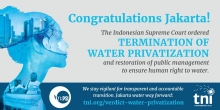Indonesian Supreme Court Terminates Water Privatization!

Our colleagues, allies and friends in Indonesia informed us of the final judicial appeal in the 20-year long illegal privatization of Jakarta City’s water services – one of the last acts of the Suharto dictatorship in 1997.
PSI General Secretary Rosa Pavanelli said : “I congratulate our affiliates and our allies in Indonesia and around the world who have been standing firm, in solidarity with this important campaign. PSI welcomes the decision of the Supreme Court, which reaffirms the priority of People Over Profit, set firmly in the context of the Human Right to Water. I especially want to congratulate the activists in Jakarta who have stayed the course for many years, through good times and bad.”
The Indonesian Supreme Court on October 9, 2017 announced that it ruled against privatization of water services in Jakarta. In its verdict, the Supreme Court orders the provincial and central governments to end the water privatization and return the water services to the public water utility. The contract agreements with two private water operators are annulled.
The Supreme Court states that the defendants, which include the provincial government of Jakarta, the central government, and the two private water operators, failed to protect the residents’ human rights to water. In addition, transferring the water services to private water operators is a violation of law.
The Supreme Court orders the defendants to:
-
terminate the policy of privatization of drinking water services in Jakarta;
-
restore the management of drinking water in Jakarta according to the Regulation on State Owned Water Company of Jakarta and other related regulations;
-
implement a management of drinking water in Jakarta in accordance with the principles and values of human rights to water as stated in Articles 11 and 12 of the International Covenant on Economic, Social and Cultural Rights as ratified by Law Number 11/2005 in conjunction with the United Nations Committee for Economic, Social and Cultural Rights General Comment Number 15/2002 on Human Rights to Water.
The verdict grants the appeal of Jakarta residents in the citizen lawsuit aimed at annulling the water privatization concession contracts. The citizen lawsuit was filed in 2012 by the Coalition of Jakarta Residents Opposing Water Privatization (KMMSAJ). They won in March 2015 at the Central Jakarta District Court which decided that the water privatization must end as it violated the law, and that the water services should be returned to the public water utility. However, the group faced an uphill battle in 2016 when the Jakarta High Court overruled the Central Jakarta District Court’s decision, granting the government’s appeal to continue the privatization. Then finally the Supreme Court approved a cassation appeal.
The public interest lawyer Arif Maulana of Jakarta Legal Aid Institute who fought for KMMSAJ said :
“This ruling is a victory for the citizens of Jakarta and the world to fulfill the right to water. However, the Government of Indonesia urgently needs to ensure the privatization of water in Jakarta is completely stopped”.
The Court reached its decision in April 2017, but this was made public only in October. In that six-month period, the owners of the two companies operating in Jakarta sold all of their shares. One of the companies is now owned by Salim Group, which belongs to the family of Suharto’s closest crony, and the person who initially pushed the privatization in 1996-7. The other company is now owned by two shell companies listed on the Singapore Stock Exchange.Who the ultimate the beneficiary owners are remains unclear. We want to ensure that the mandated return to public ownership and transition is done in a transparent and accountable manner, in such a way that the corporations don’t squeeze out further unearned profits, and impose large debt burdens on the government of Jakarta and its people. We need to warn against lawsuits using international investor protections mechanisms which can be used to delay endlessly the decisions of the courts and cost taxpayers millions in unnecessary legal fees and possible liabilities.
PSI also urges all of the workers in the various water companies to stay the course and continue to defend the interests of all the people of Jakarta – who need reliable access to quality water and sanitation service.
Rosa Pavanelli said, “Given that the court decision annuls the private concession contracts, we want to know what happens to the workers of these two companies. They will need to be integrated in a fair and equitable manner in the public water utility that must take over these two concessions. Addressing the uncertainty of the workers must be a priority issue in the transition.”
“We will work in the communities to ensure that the voices of the workers, the poor and the powerless are integrated into the decision-making. And we will ensure that the expertise and commitment of the workers is recognized and appropriately utilized in the rebuilding of a strong public water utility, dedicated to implementing the human right to water, and ensuring universal access.”
TNI director Fiona Dove said:
“The future of Jakarta water will require time, patience and lots of political good will. We are committed to helping the Government of Jakarta in this rebuilding process. We will seek out public-public partnerships which should help to rehabilitate the city-owned water operator PAM Jaya’s capacity in peer to peer solidarity cooperation. ”
(Text from Transnational Institute)

